Scott M. Graffius Speaking on Ensuring that Projects are Aligned with Strategic Objectives and Other Key Factors at California Inland Empire Chapter of Project Management Institute
06 November 2020
Follow @scottgraffius
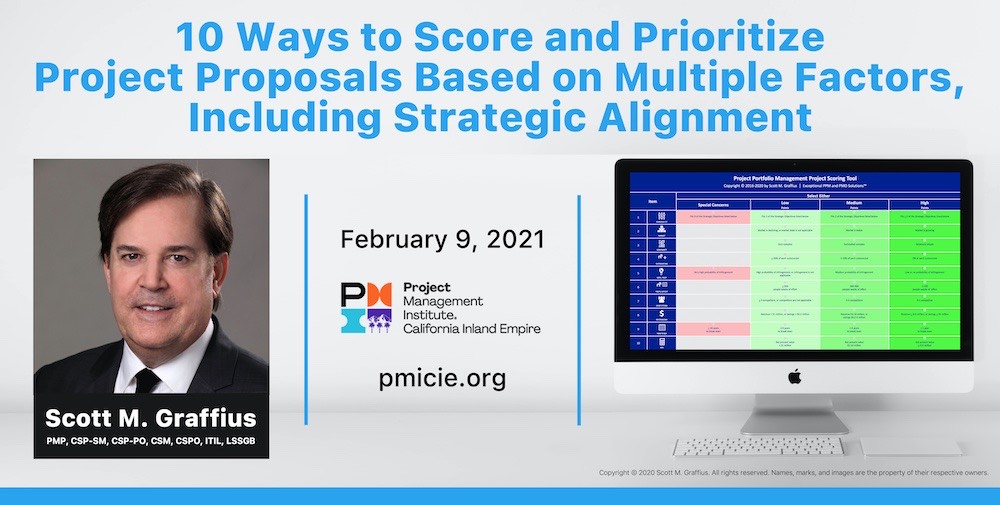
Scott M. Graffius will present “10 Ways to Score and Prioritize Project Proposals Based on Multiple Factors, Including Strategic Alignment” at an event of the California Inland Empire Chapter of the Project Management Institute (PMICIE Chapter). The session will occur on Tuesday, February 9, 2021. It will be Scott's third talk at the Chapter.
Everyone is welcome to attend (PMICIE membership is not required). To register, visit here.
Attendees of this session may be eligible to receive continuing education unit (CEU) credit, equivalent to 1.50 hours. For reporting with the Project Management Institute (PMI), it’s 1.50 professional development units (PDUs), under the Strategic and Business Management category. For reporting with the Scrum Alliance, it’s 1.50 Scrum educational units (SEUs), under either the Learning category or the Events category. For reporting with other organizations, refer to their respective instructions.

Description of Talk
How does your organization assess proposals for new projects? Is there a well-defined scoring and prioritization process — based on alignment with the business’ strategic objectives and other factors — to quickly
 and easily identify the objective value of each proposal (including how important it is relative to other initiatives)? If the answer is “no,” keep reading. If the answer is “yes,” you are likely to find practical information and examples in this talk to adapt and adopt to improve the process at your organization.
and easily identify the objective value of each proposal (including how important it is relative to other initiatives)? If the answer is “no,” keep reading. If the answer is “yes,” you are likely to find practical information and examples in this talk to adapt and adopt to improve the process at your organization.

Benefits (Key Learning Objectives)
This talk will help you develop and enhance the contributions you make to your organization by being able to:

Audience
This session is designed to be of value to project, program, and portfolio managers; project, program, and portfolio management office staff; Center of Excellence staff; Scrum Masters, Product Owners, agile coaches, and other agile practitioners and staff; executives making decisions about organization strategy; functional managers; researchers; customers; and additional stakeholders.

References
The talk draws on the speaker’s first-hand experience, with his guidance supported by related standards, best practices, and recommendations from the Project Management Institute, IEEE, MIT, Harvard Business Review, Scrum Alliance, Deloitte, and others.


Speaker Bio

Scott M. Graffius, PMP, CSP-SM, CSP-PO, CSM, CSPO, ITIL, LSSGB is an agile project management consultant, practitioner, award-winning author, and keynote speaker. Content from his books, speaking engagements, and more has been used by businesses, governments, and universities, including: Gartner, Cisco, Ford, Qantas, Atlassian, Bayer, the United States Department of Energy, the New Zealand Ministry of Education, Tufts University, Texas A&M, and others. Thinkers360 named Scott a Top 20 Global Thought Leader and Influencer on Agile.
His full bio is available here.
Connect with Scott on:
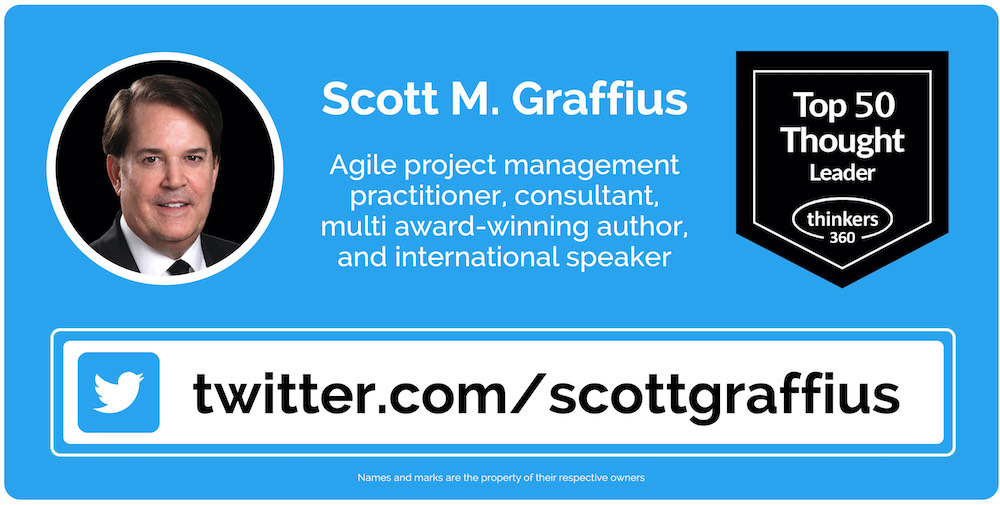

About Agile Scrum: Your Quick Start Guide with Step-by-Step Instructions
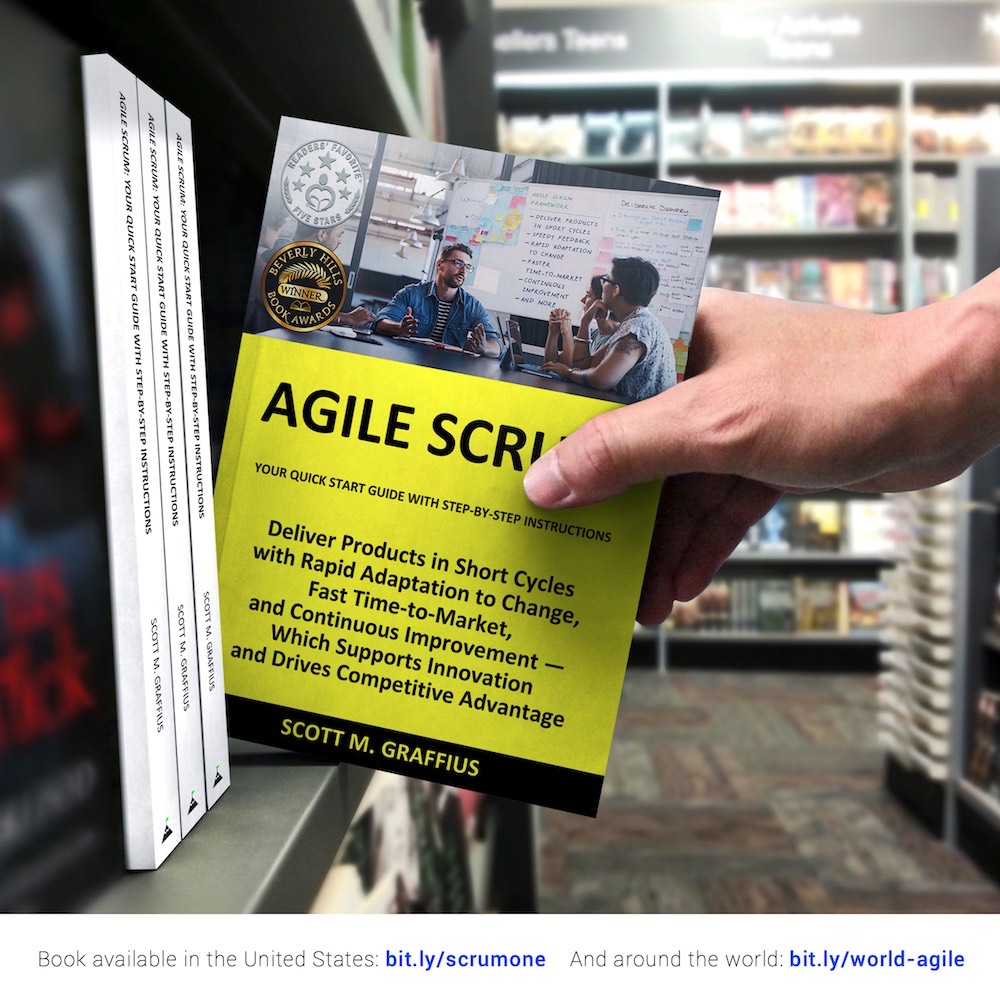
Shifting customer needs are common in today's marketplace. Businesses must be adaptive and responsive to change while delivering an exceptional customer experience to be competitive.
There are a variety of frameworks supporting the development of products and services, and most approaches fall into one of two broad categories: traditional or agile. Traditional practices such as waterfall engage sequential development, while agile involves iterative and incremental deliverables. Organizations are increasingly embracing agile to manage projects, and best meet their business needs of rapid response to change, fast delivery speed, and more.
With clear and easy to follow step-by-step instructions, Scott M. Graffius's award-winning Agile Scrum: Your Quick Start Guide with Step-by-Step Instructions helps the reader:
Hailed by Literary Titan as “the book highlights the versatility of Scrum beautifully.”
Winner of 17 first place awards.
Agile Scrum: Your Quick Start Guide with Step-by-Step Instructions is available in paperback and ebook/Kindle in the United States and around the world. Some links by country follow.

About Agile Transformation: A Brief Story of How an Entertainment Company Developed New Capabilities and Unlocked Business Agility to Thrive in an Era of Rapid Change
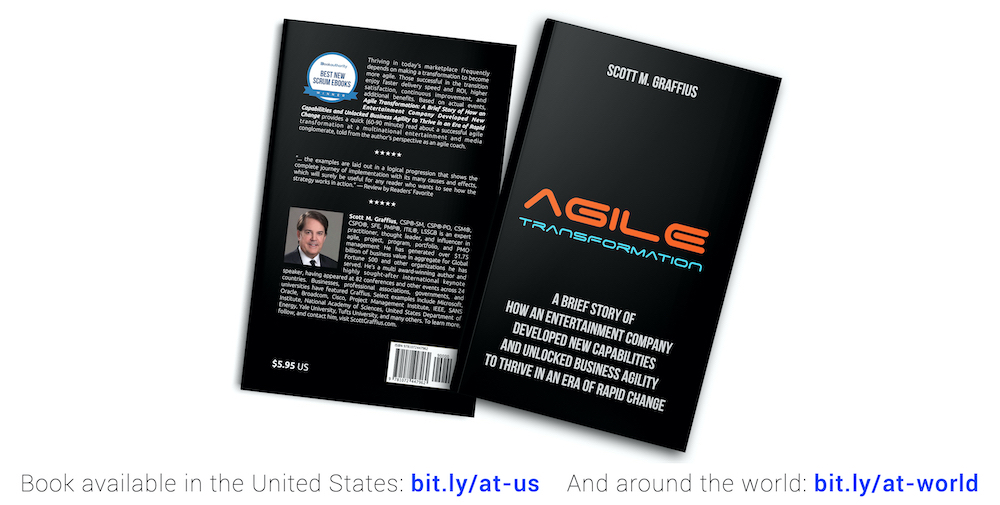
Thriving in today's marketplace frequently depends on making a transformation to become more agile. Those successful in the transition enjoy faster delivery speed and ROI, higher satisfaction, continuous improvement, and additional benefits.
Based on actual events, Agile Transformation: A Brief Story of How an Entertainment Company Developed New Capabilities and Unlocked Business Agility to Thrive in an Era of Rapid Change provides a quick (60-90 minute) read about a successful agile transformation at a multinational entertainment and media company, told from the author's perspective as an agile coach.
The award-winning book by Scott M. Graffius is available in paperback and ebook/Kindle in the United States and around the world. Some links by country follow.

About the California Inland Empire Chapter of the Project Management Institute
The Project Management Institute - California Inland Empire (PMICIE) Chapter was chartered by the Project Management Institute in 2002. Based in Rancho Cucamonga, California, it is committed to the advancement of the project management profession. The Chapter provides its members with networking, training, and professional development opportunities. Its website is https://pmicie.org.

© Copyright 2020 Scott M. Graffius. All rights reserved. This material may not be published, broadcast, rewritten or redistributed without the express written permission of Scott M. Graffius.


Scott M. Graffius will present “10 Ways to Score and Prioritize Project Proposals Based on Multiple Factors, Including Strategic Alignment” at an event of the California Inland Empire Chapter of the Project Management Institute (PMICIE Chapter). The session will occur on Tuesday, February 9, 2021. It will be Scott's third talk at the Chapter.
- Description on PMICIE Chapter’s website
- Date: Tuesday, February 9, 2021
- Time: 6:00-8:00 p.m. Pacific Standard Time
- Location: Virtual
Everyone is welcome to attend (PMICIE membership is not required). To register, visit here.
Attendees of this session may be eligible to receive continuing education unit (CEU) credit, equivalent to 1.50 hours. For reporting with the Project Management Institute (PMI), it’s 1.50 professional development units (PDUs), under the Strategic and Business Management category. For reporting with the Scrum Alliance, it’s 1.50 Scrum educational units (SEUs), under either the Learning category or the Events category. For reporting with other organizations, refer to their respective instructions.

Description of Talk
How does your organization assess proposals for new projects? Is there a well-defined scoring and prioritization process — based on alignment with the business’ strategic objectives and other factors — to quickly
 and easily identify the objective value of each proposal (including how important it is relative to other initiatives)? If the answer is “no,” keep reading. If the answer is “yes,” you are likely to find practical information and examples in this talk to adapt and adopt to improve the process at your organization.
and easily identify the objective value of each proposal (including how important it is relative to other initiatives)? If the answer is “no,” keep reading. If the answer is “yes,” you are likely to find practical information and examples in this talk to adapt and adopt to improve the process at your organization.
Benefits (Key Learning Objectives)
This talk will help you develop and enhance the contributions you make to your organization by being able to:
- Understand the benefits of scoring and prioritizing project proposals based on strategic alignment and other factors.
- Identify selection and prioritization criteria appropriate for your unique organization, leveraging the flexible framework and some or all of the 10 factors presented during the talk.
- Put the practical, actionable information presented to use. During the session, we will run an example project proposal through the process, step-by-step. You will receive a summary “cheat sheet” that you can reference as a guide to help implement or improve this process at your organization.

Audience
This session is designed to be of value to project, program, and portfolio managers; project, program, and portfolio management office staff; Center of Excellence staff; Scrum Masters, Product Owners, agile coaches, and other agile practitioners and staff; executives making decisions about organization strategy; functional managers; researchers; customers; and additional stakeholders.


References
The talk draws on the speaker’s first-hand experience, with his guidance supported by related standards, best practices, and recommendations from the Project Management Institute, IEEE, MIT, Harvard Business Review, Scrum Alliance, Deloitte, and others.

Speaker Bio

Scott M. Graffius, PMP, CSP-SM, CSP-PO, CSM, CSPO, ITIL, LSSGB is an agile project management consultant, practitioner, award-winning author, and keynote speaker. Content from his books, speaking engagements, and more has been used by businesses, governments, and universities, including: Gartner, Cisco, Ford, Qantas, Atlassian, Bayer, the United States Department of Energy, the New Zealand Ministry of Education, Tufts University, Texas A&M, and others. Thinkers360 named Scott a Top 20 Global Thought Leader and Influencer on Agile.
His full bio is available here.
Connect with Scott on:


About Agile Scrum: Your Quick Start Guide with Step-by-Step Instructions

Shifting customer needs are common in today's marketplace. Businesses must be adaptive and responsive to change while delivering an exceptional customer experience to be competitive.
There are a variety of frameworks supporting the development of products and services, and most approaches fall into one of two broad categories: traditional or agile. Traditional practices such as waterfall engage sequential development, while agile involves iterative and incremental deliverables. Organizations are increasingly embracing agile to manage projects, and best meet their business needs of rapid response to change, fast delivery speed, and more.
With clear and easy to follow step-by-step instructions, Scott M. Graffius's award-winning Agile Scrum: Your Quick Start Guide with Step-by-Step Instructions helps the reader:
- Implement and use the most popular agile framework―Scrum;
- Deliver products in short cycles with rapid adaptation to change, fast time-to-market, and continuous improvement; and
- Support innovation and drive competitive advantage.
Hailed by Literary Titan as “the book highlights the versatility of Scrum beautifully.”
Winner of 17 first place awards.
Agile Scrum: Your Quick Start Guide with Step-by-Step Instructions is available in paperback and ebook/Kindle in the United States and around the world. Some links by country follow.
- 🇧🇷 Brazil
- 🇨🇦 Canada
- 🇨🇿 Czech Republic
- 🇩🇰 Denmark
- 🇫🇮 Finland
- 🇫🇷 France
- 🇩🇪 Germany
- 🇬🇷 Greece
- 🇭🇺 Hungary
- 🇮🇳 India
- 🇮🇪 Ireland
- 🇮🇱 Israel
- 🇮🇹 Italy
- 🇯🇵 Japan
- 🇱🇺 Luxembourg
- 🇲🇽 Mexico
- 🇳🇱 Netherlands
- 🇳🇿 New Zealand
- 🇳🇴 Norway
- 🇪🇸 Spain
- 🇸🇪 Sweden
- 🇨🇭 Switzerland
- 🇦🇪 UAE
- 🇬🇧 United Kingdom
- 🇺🇸 United States

About Agile Transformation: A Brief Story of How an Entertainment Company Developed New Capabilities and Unlocked Business Agility to Thrive in an Era of Rapid Change

Thriving in today's marketplace frequently depends on making a transformation to become more agile. Those successful in the transition enjoy faster delivery speed and ROI, higher satisfaction, continuous improvement, and additional benefits.
Based on actual events, Agile Transformation: A Brief Story of How an Entertainment Company Developed New Capabilities and Unlocked Business Agility to Thrive in an Era of Rapid Change provides a quick (60-90 minute) read about a successful agile transformation at a multinational entertainment and media company, told from the author's perspective as an agile coach.
The award-winning book by Scott M. Graffius is available in paperback and ebook/Kindle in the United States and around the world. Some links by country follow.
- 🇦🇺 Australia
- 🇦🇹 Austria
- 🇧🇷 Brazil
- 🇨🇦 Canada
- 🇨🇿 Czech Republic
- 🇩🇰 Denmark
- 🇫🇮 Finland
- 🇫🇷 France
- 🇩🇪 Germany
- 🇬🇷 Greece
- 🇮🇳 India
- 🇮🇪 Ireland
- 🇯🇵 Japan
- 🇱🇺 Luxembourg
- 🇲🇽 Mexico
- 🇳🇱 Netherlands
- 🇳🇿 New Zealand
- 🇪🇸 Spain
- 🇸🇪 Sweden
- 🇨🇭 Switzerland
- 🇦🇪 United Arab Emirates
- 🇬🇧 United Kingdom
- 🇺🇸 United States

About the California Inland Empire Chapter of the Project Management Institute
The Project Management Institute - California Inland Empire (PMICIE) Chapter was chartered by the Project Management Institute in 2002. Based in Rancho Cucamonga, California, it is committed to the advancement of the project management profession. The Chapter provides its members with networking, training, and professional development opportunities. Its website is https://pmicie.org.

© Copyright 2020 Scott M. Graffius. All rights reserved. This material may not be published, broadcast, rewritten or redistributed without the express written permission of Scott M. Graffius.

Scott M. Graffius Speaking at Southwest Virginia Chapter of Project Management Institute
13 January 2021
Follow @scottgraffius
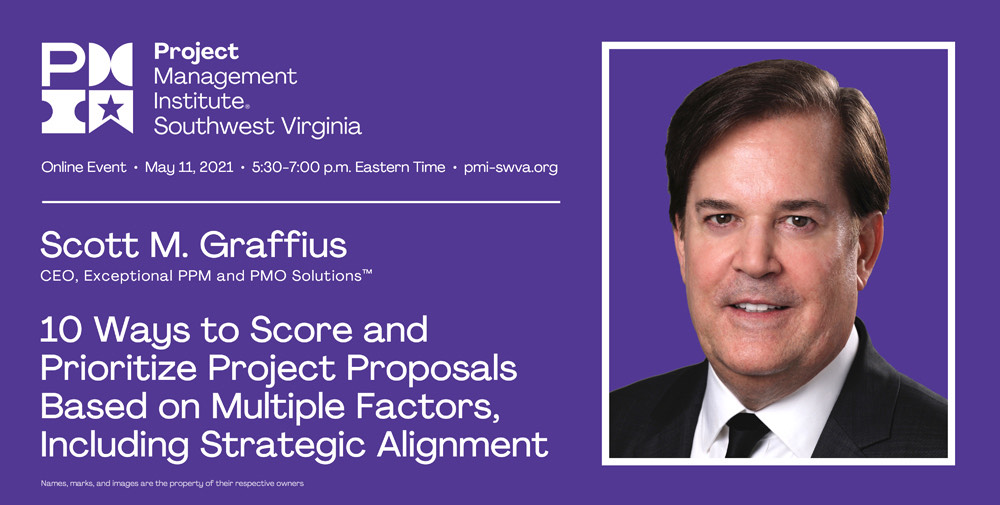
Scott M. Graffius will deliver the talk, “10 Ways to Score and Prioritize Project Proposals Based on Multiple Factors, Including Strategic Alignment,” at a virtual event of the Southwest Virginia Chapter of the Project Management Institute on May 11, 2021, from 5:30-7:00 p.m. Eastern Time. To learn more and to register for the event, visit here.
Attendees may be eligible to receive continuing education unit (CEU) credit, equivalent to 1.50 hours. For reporting with the Project Management Institute (PMI), it's 1.50 professional development units (PDUs), under the Strategic and Business Management category. For reporting with the Scrum Alliance, it's 1.50 Scrum educational units (SEUs), under either the Learning category or the Events category. For reporting with other organizations, refer to their respective instructions.


About Scott M. Graffius

Scott M. Graffius, PMP, CSP-SM, CSP-PO, CSM, CSPO, SFE, ITIL, LSSGB is an agile project management practitioner, consultant, award-winning author, and international speaker. He has generated over one billion dollars of business value in aggregate for the organizations he has served. Graffius is the founder, CEO, and principal consultant at Exceptional PPM and PMO Solutions™ and subsidiary Exceptional Agility™, based in Los Angeles, California. His expertise spans project, program, portfolio, and PMO leadership inclusive of agile, traditional, and hybrid approaches. Content from his books (Agile Scrum and Agile Transformation), workshops, speaking engagements, and more have been featured and used by businesses, governments, and universities including Gartner, Microsoft, Deloitte, Oracle, Cisco, Ford, Qantas, Atlassian, Bayer, the National Academy of Sciences, the United States Department of Energy, the United States Army, Project Management Institute, the IEEE, the New Zealand Ministry of Education, Tufts University, Texas A&M University, Virginia Tech, Penn State, Warsaw University of Technology, University of Waterloo, Loughborough University London, and others. Graffius has spoken at 58 conferences and other events around the world, including Armenia, Australia, Brazil, Canada, Czech Republic, Finland, France, Germany, Greece, India, Ireland, Lithuania, Luxembourg, Netherlands, New Zealand, Sweden, United Kingdom, and the United States. Thinkers360 named Graffius a global top thought leader and influencer in four domains: Agile, Change Management, Digital Transformation, and GovTech.
His full bio is available here.
Connect with Scott on:


About Agile Scrum: Your Quick Start Guide with Step-by-Step Instructions

Shifting customer needs are common in today's marketplace. Businesses must be adaptive and responsive to change while delivering an exceptional customer experience to be competitive.
There are a variety of frameworks supporting the development of products and services, and most approaches fall into one of two broad categories: traditional or agile. Traditional practices such as waterfall engage sequential development, while agile involves iterative and incremental deliverables. Organizations are increasingly embracing agile to manage projects, and best meet their business needs of rapid response to change, fast delivery speed, and more.
With clear and easy to follow step-by-step instructions, Scott M. Graffius's award-winning Agile Scrum: Your Quick Start Guide with Step-by-Step Instructions helps the reader:
Hailed by Literary Titan as “the book highlights the versatility of Scrum beautifully.”
Winner of 17 first place awards.
Agile Scrum: Your Quick Start Guide with Step-by-Step Instructions is available in paperback and ebook/Kindle in the United States and around the world. Some links by country follow.

About Agile Transformation: A Brief Story of How an Entertainment Company Developed New Capabilities and Unlocked Business Agility to Thrive in an Era of Rapid Change

Thriving in today's marketplace frequently depends on making a transformation to become more agile. Those successful in the transition enjoy faster delivery speed and ROI, higher satisfaction, continuous improvement, and additional benefits.
Based on actual events, Agile Transformation: A Brief Story of How an Entertainment Company Developed New Capabilities and Unlocked Business Agility to Thrive in an Era of Rapid Change provides a quick (60-90 minute) read about a successful agile transformation at a multinational entertainment and media company, told from the author's perspective as an agile coach.
The award-winning book by Scott M. Graffius is available in paperback and ebook/Kindle in the United States and around the world. Some links by country follow.

About the Southwest Virginia Chapter of the Project Management Institute
The Southwest Virginia Chapter of the Project Management Institute was founded in 2003 to serve the southwestern part of Virginia including the metro areas of Roanoke, Lynchburg, Blacksburg, Lexington, Martinsville, Danville, and Bristol. The Chapter's mission is to foster a community of project management excellence in Southwest Virginia. To learn more, visit https://pmi-swva.org.

© Copyright 2021 Scott M. Graffius. All rights reserved. This material may not be published, broadcast, rewritten or redistributed without the express written permission of Scott M. Graffius.


Scott M. Graffius will deliver the talk, “10 Ways to Score and Prioritize Project Proposals Based on Multiple Factors, Including Strategic Alignment,” at a virtual event of the Southwest Virginia Chapter of the Project Management Institute on May 11, 2021, from 5:30-7:00 p.m. Eastern Time. To learn more and to register for the event, visit here.
Attendees may be eligible to receive continuing education unit (CEU) credit, equivalent to 1.50 hours. For reporting with the Project Management Institute (PMI), it's 1.50 professional development units (PDUs), under the Strategic and Business Management category. For reporting with the Scrum Alliance, it's 1.50 Scrum educational units (SEUs), under either the Learning category or the Events category. For reporting with other organizations, refer to their respective instructions.

About Scott M. Graffius

Scott M. Graffius, PMP, CSP-SM, CSP-PO, CSM, CSPO, SFE, ITIL, LSSGB is an agile project management practitioner, consultant, award-winning author, and international speaker. He has generated over one billion dollars of business value in aggregate for the organizations he has served. Graffius is the founder, CEO, and principal consultant at Exceptional PPM and PMO Solutions™ and subsidiary Exceptional Agility™, based in Los Angeles, California. His expertise spans project, program, portfolio, and PMO leadership inclusive of agile, traditional, and hybrid approaches. Content from his books (Agile Scrum and Agile Transformation), workshops, speaking engagements, and more have been featured and used by businesses, governments, and universities including Gartner, Microsoft, Deloitte, Oracle, Cisco, Ford, Qantas, Atlassian, Bayer, the National Academy of Sciences, the United States Department of Energy, the United States Army, Project Management Institute, the IEEE, the New Zealand Ministry of Education, Tufts University, Texas A&M University, Virginia Tech, Penn State, Warsaw University of Technology, University of Waterloo, Loughborough University London, and others. Graffius has spoken at 58 conferences and other events around the world, including Armenia, Australia, Brazil, Canada, Czech Republic, Finland, France, Germany, Greece, India, Ireland, Lithuania, Luxembourg, Netherlands, New Zealand, Sweden, United Kingdom, and the United States. Thinkers360 named Graffius a global top thought leader and influencer in four domains: Agile, Change Management, Digital Transformation, and GovTech.
His full bio is available here.
Connect with Scott on:


About Agile Scrum: Your Quick Start Guide with Step-by-Step Instructions

Shifting customer needs are common in today's marketplace. Businesses must be adaptive and responsive to change while delivering an exceptional customer experience to be competitive.
There are a variety of frameworks supporting the development of products and services, and most approaches fall into one of two broad categories: traditional or agile. Traditional practices such as waterfall engage sequential development, while agile involves iterative and incremental deliverables. Organizations are increasingly embracing agile to manage projects, and best meet their business needs of rapid response to change, fast delivery speed, and more.
With clear and easy to follow step-by-step instructions, Scott M. Graffius's award-winning Agile Scrum: Your Quick Start Guide with Step-by-Step Instructions helps the reader:
- Implement and use the most popular agile framework―Scrum;
- Deliver products in short cycles with rapid adaptation to change, fast time-to-market, and continuous improvement; and
- Support innovation and drive competitive advantage.
Hailed by Literary Titan as “the book highlights the versatility of Scrum beautifully.”
Winner of 17 first place awards.
Agile Scrum: Your Quick Start Guide with Step-by-Step Instructions is available in paperback and ebook/Kindle in the United States and around the world. Some links by country follow.
- 🇧🇷 Brazil
- 🇨🇦 Canada
- 🇨🇿 Czech Republic
- 🇩🇰 Denmark
- 🇫🇮 Finland
- 🇫🇷 France
- 🇩🇪 Germany
- 🇬🇷 Greece
- 🇭🇺 Hungary
- 🇮🇳 India
- 🇮🇪 Ireland
- 🇮🇱 Israel
- 🇮🇹 Italy
- 🇯🇵 Japan
- 🇱🇺 Luxembourg
- 🇲🇽 Mexico
- 🇳🇱 Netherlands
- 🇳🇿 New Zealand
- 🇳🇴 Norway
- 🇪🇸 Spain
- 🇸🇪 Sweden
- 🇨🇭 Switzerland
- 🇦🇪 UAE
- 🇬🇧 United Kingdom
- 🇺🇸 United States

About Agile Transformation: A Brief Story of How an Entertainment Company Developed New Capabilities and Unlocked Business Agility to Thrive in an Era of Rapid Change

Thriving in today's marketplace frequently depends on making a transformation to become more agile. Those successful in the transition enjoy faster delivery speed and ROI, higher satisfaction, continuous improvement, and additional benefits.
Based on actual events, Agile Transformation: A Brief Story of How an Entertainment Company Developed New Capabilities and Unlocked Business Agility to Thrive in an Era of Rapid Change provides a quick (60-90 minute) read about a successful agile transformation at a multinational entertainment and media company, told from the author's perspective as an agile coach.
The award-winning book by Scott M. Graffius is available in paperback and ebook/Kindle in the United States and around the world. Some links by country follow.
- 🇦🇺 Australia
- 🇦🇹 Austria
- 🇧🇷 Brazil
- 🇨🇦 Canada
- 🇨🇿 Czech Republic
- 🇩🇰 Denmark
- 🇫🇮 Finland
- 🇫🇷 France
- 🇩🇪 Germany
- 🇬🇷 Greece
- 🇮🇳 India
- 🇮🇪 Ireland
- 🇯🇵 Japan
- 🇱🇺 Luxembourg
- 🇲🇽 Mexico
- 🇳🇱 Netherlands
- 🇳🇿 New Zealand
- 🇪🇸 Spain
- 🇸🇪 Sweden
- 🇨🇭 Switzerland
- 🇦🇪 United Arab Emirates
- 🇬🇧 United Kingdom
- 🇺🇸 United States

About the Southwest Virginia Chapter of the Project Management Institute
The Southwest Virginia Chapter of the Project Management Institute was founded in 2003 to serve the southwestern part of Virginia including the metro areas of Roanoke, Lynchburg, Blacksburg, Lexington, Martinsville, Danville, and Bristol. The Chapter's mission is to foster a community of project management excellence in Southwest Virginia. To learn more, visit https://pmi-swva.org.

© Copyright 2021 Scott M. Graffius. All rights reserved. This material may not be published, broadcast, rewritten or redistributed without the express written permission of Scott M. Graffius.

Scott M. Graffius Speaking on Ensuring Strategic Alignment at PMI Central Virginia
30 January 2021
Follow @scottgraffius
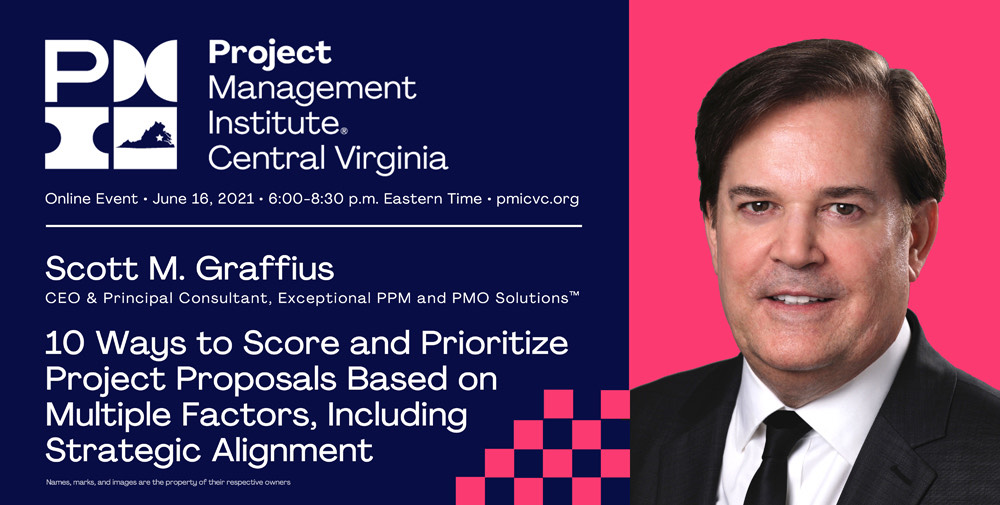
Scott M. Graffius will lead a session on strategic alignment, “10 Ways to Score and Prioritize Project Proposals Based on Multiple Factors, Including Strategic Alignment,” at a virtual event of the Central Virginia Chapter of the Project Management Institute on Wednesday, June 16, 2021. To learn more and to register for the event, visit https://pmicvc.org/calendar?eventId=6905.
Attendees may be eligible to receive continuing education unit (CEU) credit, equivalent to 1.50 hours. For reporting with the Project Management Institute (PMI), it's 1.50 professional development units (PDUs), under the Strategic and Business Management category. For reporting with the Scrum Alliance, it's 1.50 Scrum educational units (SEUs), under either the Learning category or the Events category. For reporting with other organizations, refer to their respective instructions.


About Scott M. Graffius

Scott M. Graffius, PMP, CSP-SM, CSP-PO, CSM, CSPO, SFE, ITIL, LSSGB is an agile project management practitioner, consultant, award-winning author, and international speaker. He has generated over one billion dollars of business value in aggregate for the organizations he has served. Graffius is the founder, CEO, and principal consultant at Exceptional PPM and PMO Solutions™ and subsidiary Exceptional Agility™, based in Los Angeles, California. His expertise spans project, program, portfolio, and PMO leadership inclusive of agile, traditional, and hybrid approaches. Content from his books (Agile Scrum and Agile Transformation), workshops, speaking engagements, and more have been featured and used by businesses, governments, and universities including Gartner, Microsoft, Deloitte, Oracle, Cisco, Ford, Qantas, Atlassian, Bayer, the National Academy of Sciences, the United States Department of Energy, the United States Army, Project Management Institute, the IEEE, the New Zealand Ministry of Education, Tufts University, Texas A&M University, Virginia Tech, Penn State, Warsaw University of Technology, University of Waterloo, Loughborough University London, and others. Graffius has spoken at 58 conferences and other events around the world, including Armenia, Australia, Brazil, Canada, Czech Republic, Finland, France, Germany, Greece, India, Ireland, Lithuania, Luxembourg, Netherlands, New Zealand, Sweden, United Kingdom, and the United States. Thinkers360 named Graffius a global top thought leader and influencer in four domains: Agile, Change Management, Digital Transformation, and GovTech.
His full bio is available here.
Connect with Scott on:


About Agile Scrum: Your Quick Start Guide with Step-by-Step Instructions

Shifting customer needs are common in today's marketplace. Businesses must be adaptive and responsive to change while delivering an exceptional customer experience to be competitive.
There are a variety of frameworks supporting the development of products and services, and most approaches fall into one of two broad categories: traditional or agile. Traditional practices such as waterfall engage sequential development, while agile involves iterative and incremental deliverables. Organizations are increasingly embracing agile to manage projects, and best meet their business needs of rapid response to change, fast delivery speed, and more.
With clear and easy to follow step-by-step instructions, Scott M. Graffius's award-winning Agile Scrum: Your Quick Start Guide with Step-by-Step Instructions helps the reader:
Hailed by Literary Titan as “the book highlights the versatility of Scrum beautifully.”
Winner of 17 first place awards.
Agile Scrum: Your Quick Start Guide with Step-by-Step Instructions is available in paperback and ebook/Kindle in the United States and around the world. Some links by country follow.

About Agile Transformation: A Brief Story of How an Entertainment Company Developed New Capabilities and Unlocked Business Agility to Thrive in an Era of Rapid Change

Thriving in today's marketplace frequently depends on making a transformation to become more agile. Those successful in the transition enjoy faster delivery speed and ROI, higher satisfaction, continuous improvement, and additional benefits.
Based on actual events, Agile Transformation: A Brief Story of How an Entertainment Company Developed New Capabilities and Unlocked Business Agility to Thrive in an Era of Rapid Change provides a quick (60-90 minute) read about a successful agile transformation at a multinational entertainment and media company, told from the author's perspective as an agile coach.
The award-winning book by Scott M. Graffius is available in paperback and ebook/Kindle in the United States and around the world. Some links by country follow.

About the Central Virginia Chapter of the Project Management Institute
The vision of the Central Virginia Chapter of the Project Management Institute (PMICVC) is to be the premier professional project management organization for business, civic, government, and education communities in Central Virginia. Its mission is to serve the professional interests of chapter members by enhancing expertise through project management education and training, supporting PMI certifications, and promoting association with other project management professionals. To learn more, visit the PMICVC website at https://pmicvc.org.

© Copyright 2021 Scott M. Graffius. All rights reserved. This material may not be published, broadcast, rewritten or redistributed without the express written permission of Scott M. Graffius.


Scott M. Graffius will lead a session on strategic alignment, “10 Ways to Score and Prioritize Project Proposals Based on Multiple Factors, Including Strategic Alignment,” at a virtual event of the Central Virginia Chapter of the Project Management Institute on Wednesday, June 16, 2021. To learn more and to register for the event, visit https://pmicvc.org/calendar?eventId=6905.
Attendees may be eligible to receive continuing education unit (CEU) credit, equivalent to 1.50 hours. For reporting with the Project Management Institute (PMI), it's 1.50 professional development units (PDUs), under the Strategic and Business Management category. For reporting with the Scrum Alliance, it's 1.50 Scrum educational units (SEUs), under either the Learning category or the Events category. For reporting with other organizations, refer to their respective instructions.

About Scott M. Graffius

Scott M. Graffius, PMP, CSP-SM, CSP-PO, CSM, CSPO, SFE, ITIL, LSSGB is an agile project management practitioner, consultant, award-winning author, and international speaker. He has generated over one billion dollars of business value in aggregate for the organizations he has served. Graffius is the founder, CEO, and principal consultant at Exceptional PPM and PMO Solutions™ and subsidiary Exceptional Agility™, based in Los Angeles, California. His expertise spans project, program, portfolio, and PMO leadership inclusive of agile, traditional, and hybrid approaches. Content from his books (Agile Scrum and Agile Transformation), workshops, speaking engagements, and more have been featured and used by businesses, governments, and universities including Gartner, Microsoft, Deloitte, Oracle, Cisco, Ford, Qantas, Atlassian, Bayer, the National Academy of Sciences, the United States Department of Energy, the United States Army, Project Management Institute, the IEEE, the New Zealand Ministry of Education, Tufts University, Texas A&M University, Virginia Tech, Penn State, Warsaw University of Technology, University of Waterloo, Loughborough University London, and others. Graffius has spoken at 58 conferences and other events around the world, including Armenia, Australia, Brazil, Canada, Czech Republic, Finland, France, Germany, Greece, India, Ireland, Lithuania, Luxembourg, Netherlands, New Zealand, Sweden, United Kingdom, and the United States. Thinkers360 named Graffius a global top thought leader and influencer in four domains: Agile, Change Management, Digital Transformation, and GovTech.
His full bio is available here.
Connect with Scott on:


About Agile Scrum: Your Quick Start Guide with Step-by-Step Instructions

Shifting customer needs are common in today's marketplace. Businesses must be adaptive and responsive to change while delivering an exceptional customer experience to be competitive.
There are a variety of frameworks supporting the development of products and services, and most approaches fall into one of two broad categories: traditional or agile. Traditional practices such as waterfall engage sequential development, while agile involves iterative and incremental deliverables. Organizations are increasingly embracing agile to manage projects, and best meet their business needs of rapid response to change, fast delivery speed, and more.
With clear and easy to follow step-by-step instructions, Scott M. Graffius's award-winning Agile Scrum: Your Quick Start Guide with Step-by-Step Instructions helps the reader:
- Implement and use the most popular agile framework―Scrum;
- Deliver products in short cycles with rapid adaptation to change, fast time-to-market, and continuous improvement; and
- Support innovation and drive competitive advantage.
Hailed by Literary Titan as “the book highlights the versatility of Scrum beautifully.”
Winner of 17 first place awards.
Agile Scrum: Your Quick Start Guide with Step-by-Step Instructions is available in paperback and ebook/Kindle in the United States and around the world. Some links by country follow.
- 🇧🇷 Brazil
- 🇨🇦 Canada
- 🇨🇿 Czech Republic
- 🇩🇰 Denmark
- 🇫🇮 Finland
- 🇫🇷 France
- 🇩🇪 Germany
- 🇬🇷 Greece
- 🇭🇺 Hungary
- 🇮🇳 India
- 🇮🇪 Ireland
- 🇮🇱 Israel
- 🇮🇹 Italy
- 🇯🇵 Japan
- 🇱🇺 Luxembourg
- 🇲🇽 Mexico
- 🇳🇱 Netherlands
- 🇳🇿 New Zealand
- 🇳🇴 Norway
- 🇪🇸 Spain
- 🇸🇪 Sweden
- 🇨🇭 Switzerland
- 🇦🇪 UAE
- 🇬🇧 United Kingdom
- 🇺🇸 United States

About Agile Transformation: A Brief Story of How an Entertainment Company Developed New Capabilities and Unlocked Business Agility to Thrive in an Era of Rapid Change

Thriving in today's marketplace frequently depends on making a transformation to become more agile. Those successful in the transition enjoy faster delivery speed and ROI, higher satisfaction, continuous improvement, and additional benefits.
Based on actual events, Agile Transformation: A Brief Story of How an Entertainment Company Developed New Capabilities and Unlocked Business Agility to Thrive in an Era of Rapid Change provides a quick (60-90 minute) read about a successful agile transformation at a multinational entertainment and media company, told from the author's perspective as an agile coach.
The award-winning book by Scott M. Graffius is available in paperback and ebook/Kindle in the United States and around the world. Some links by country follow.
- 🇦🇺 Australia
- 🇦🇹 Austria
- 🇧🇷 Brazil
- 🇨🇦 Canada
- 🇨🇿 Czech Republic
- 🇩🇰 Denmark
- 🇫🇮 Finland
- 🇫🇷 France
- 🇩🇪 Germany
- 🇬🇷 Greece
- 🇮🇳 India
- 🇮🇪 Ireland
- 🇯🇵 Japan
- 🇱🇺 Luxembourg
- 🇲🇽 Mexico
- 🇳🇱 Netherlands
- 🇳🇿 New Zealand
- 🇪🇸 Spain
- 🇸🇪 Sweden
- 🇨🇭 Switzerland
- 🇦🇪 United Arab Emirates
- 🇬🇧 United Kingdom
- 🇺🇸 United States

About the Central Virginia Chapter of the Project Management Institute
The vision of the Central Virginia Chapter of the Project Management Institute (PMICVC) is to be the premier professional project management organization for business, civic, government, and education communities in Central Virginia. Its mission is to serve the professional interests of chapter members by enhancing expertise through project management education and training, supporting PMI certifications, and promoting association with other project management professionals. To learn more, visit the PMICVC website at https://pmicvc.org.

© Copyright 2021 Scott M. Graffius. All rights reserved. This material may not be published, broadcast, rewritten or redistributed without the express written permission of Scott M. Graffius.

Scott M. Graffius Speaking on Ensuring Strategic Alignment at Florida Suncoast Chapter of the Project Management Institute
13 April 2021
Follow @scottgraffius
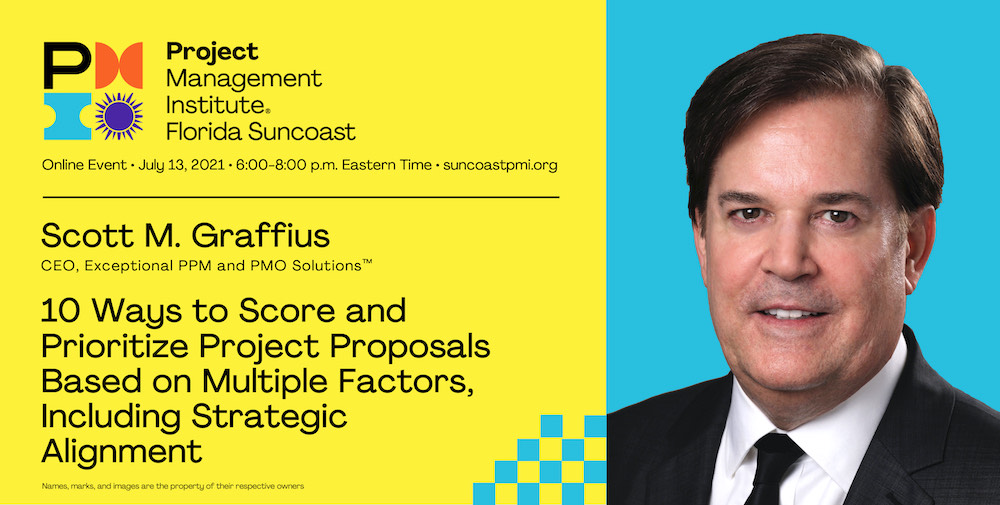
Scott M. Graffius will lead a session on strategic alignment, “10 Ways to Score and Prioritize Project Proposals Based on Multiple Factors, Including Strategic Alignment,” at an online event of the Florida Suncoast Chapter of the Project Management Institute on Tuesday, July 13, 2021, from 6:00-8:00 p.m. Eastern Time. To learn more and to register for the event, visit https://suncoastpmi.org/meetinginfo.php?id=125.
Attendees may be eligible to receive continuing education unit (CEU) credit, equivalent to 1.50 hours. For reporting with the Project Management Institute (PMI), it's 1.50 professional development units (PDUs), under the Strategic and Business Management category. For reporting with the Scrum Alliance, it's 1.50 Scrum educational units (SEUs), under either the Learning category or the Events category. For reporting with other organizations, refer to their respective instructions.


About Scott M. Graffius

Scott M. Graffius, PMP, CSP-SM, CSP-PO, CSM, CSPO, SFE, ITIL, LSSGB is an agile project management practitioner, consultant, award-winning author, and international speaker. He has generated over one billion dollars of business value in aggregate for the organizations he has served. Graffius is the founder, CEO, and principal consultant at Exceptional PPM and PMO Solutions™ and subsidiary Exceptional Agility™, based in Los Angeles, California. His expertise spans project, program, portfolio, and PMO leadership inclusive of agile, traditional, and hybrid approaches. Content from his books (Agile Scrum and Agile Transformation), workshops, speaking engagements, and more have been featured and used by businesses, governments, and universities including Gartner, Microsoft, Deloitte, Oracle, Cisco, Ford, Qantas, Atlassian, Bayer, the National Academy of Sciences, the United States Department of Energy, the United States Army, Project Management Institute, the IEEE, the New Zealand Ministry of Education, Tufts University, Texas A&M University, Virginia Tech, Penn State, Warsaw University of Technology, University of Waterloo, Loughborough University London, and others. Graffius has spoken at 58 conferences and other events around the world, including Armenia, Australia, Brazil, Canada, Czech Republic, Finland, France, Germany, Greece, India, Ireland, Lithuania, Luxembourg, Netherlands, New Zealand, Sweden, United Kingdom, and the United States. Thinkers360 named Graffius a global top thought leader and influencer in four domains: Agile, Change Management, Digital Transformation, and GovTech.
His full bio is available here.
Connect with Scott on:


About Agile Scrum: Your Quick Start Guide with Step-by-Step Instructions

Shifting customer needs are common in today's marketplace. Businesses must be adaptive and responsive to change while delivering an exceptional customer experience to be competitive.
There are a variety of frameworks supporting the development of products and services, and most approaches fall into one of two broad categories: traditional or agile. Traditional practices such as waterfall engage sequential development, while agile involves iterative and incremental deliverables. Organizations are increasingly embracing agile to manage projects, and best meet their business needs of rapid response to change, fast delivery speed, and more.
With clear and easy to follow step-by-step instructions, Scott M. Graffius's award-winning Agile Scrum: Your Quick Start Guide with Step-by-Step Instructions helps the reader:
Hailed by Literary Titan as “the book highlights the versatility of Scrum beautifully.”
Winner of 17 first place awards.
Agile Scrum: Your Quick Start Guide with Step-by-Step Instructions is available in paperback and ebook/Kindle in the United States and around the world. Some links by country follow.

About Agile Transformation: A Brief Story of How an Entertainment Company Developed New Capabilities and Unlocked Business Agility to Thrive in an Era of Rapid Change

Thriving in today's marketplace frequently depends on making a transformation to become more agile. Those successful in the transition enjoy faster delivery speed and ROI, higher satisfaction, continuous improvement, and additional benefits.
Based on actual events, Agile Transformation: A Brief Story of How an Entertainment Company Developed New Capabilities and Unlocked Business Agility to Thrive in an Era of Rapid Change provides a quick (60-90 minute) read about a successful agile transformation at a multinational entertainment and media company, told from the author's perspective as an agile coach.
The award-winning book by Scott M. Graffius is available in paperback and ebook/Kindle in the United States and around the world. Some links by country follow.

About the Florida Suncoast Chapter of the Project Management Institute
The Florida Suncoast Chapter of the Project Management Institute (PMI) leads the local community in the advancement of project management by promoting the PMI’s values and principles, as well as by organizing and facilitating events, activities, and initiatives to support individuals and organizations. The Chapter's objectives include:
To learn more, visit the Chapter's website at https://suncoastpmi.org.
© Copyright 2021 Scott M. Graffius. All rights reserved. This material may not be published, broadcast, rewritten or redistributed without the express written permission of Scott M. Graffius.


Scott M. Graffius will lead a session on strategic alignment, “10 Ways to Score and Prioritize Project Proposals Based on Multiple Factors, Including Strategic Alignment,” at an online event of the Florida Suncoast Chapter of the Project Management Institute on Tuesday, July 13, 2021, from 6:00-8:00 p.m. Eastern Time. To learn more and to register for the event, visit https://suncoastpmi.org/meetinginfo.php?id=125.
Attendees may be eligible to receive continuing education unit (CEU) credit, equivalent to 1.50 hours. For reporting with the Project Management Institute (PMI), it's 1.50 professional development units (PDUs), under the Strategic and Business Management category. For reporting with the Scrum Alliance, it's 1.50 Scrum educational units (SEUs), under either the Learning category or the Events category. For reporting with other organizations, refer to their respective instructions.

About Scott M. Graffius

Scott M. Graffius, PMP, CSP-SM, CSP-PO, CSM, CSPO, SFE, ITIL, LSSGB is an agile project management practitioner, consultant, award-winning author, and international speaker. He has generated over one billion dollars of business value in aggregate for the organizations he has served. Graffius is the founder, CEO, and principal consultant at Exceptional PPM and PMO Solutions™ and subsidiary Exceptional Agility™, based in Los Angeles, California. His expertise spans project, program, portfolio, and PMO leadership inclusive of agile, traditional, and hybrid approaches. Content from his books (Agile Scrum and Agile Transformation), workshops, speaking engagements, and more have been featured and used by businesses, governments, and universities including Gartner, Microsoft, Deloitte, Oracle, Cisco, Ford, Qantas, Atlassian, Bayer, the National Academy of Sciences, the United States Department of Energy, the United States Army, Project Management Institute, the IEEE, the New Zealand Ministry of Education, Tufts University, Texas A&M University, Virginia Tech, Penn State, Warsaw University of Technology, University of Waterloo, Loughborough University London, and others. Graffius has spoken at 58 conferences and other events around the world, including Armenia, Australia, Brazil, Canada, Czech Republic, Finland, France, Germany, Greece, India, Ireland, Lithuania, Luxembourg, Netherlands, New Zealand, Sweden, United Kingdom, and the United States. Thinkers360 named Graffius a global top thought leader and influencer in four domains: Agile, Change Management, Digital Transformation, and GovTech.
His full bio is available here.
Connect with Scott on:


About Agile Scrum: Your Quick Start Guide with Step-by-Step Instructions

Shifting customer needs are common in today's marketplace. Businesses must be adaptive and responsive to change while delivering an exceptional customer experience to be competitive.
There are a variety of frameworks supporting the development of products and services, and most approaches fall into one of two broad categories: traditional or agile. Traditional practices such as waterfall engage sequential development, while agile involves iterative and incremental deliverables. Organizations are increasingly embracing agile to manage projects, and best meet their business needs of rapid response to change, fast delivery speed, and more.
With clear and easy to follow step-by-step instructions, Scott M. Graffius's award-winning Agile Scrum: Your Quick Start Guide with Step-by-Step Instructions helps the reader:
- Implement and use the most popular agile framework―Scrum;
- Deliver products in short cycles with rapid adaptation to change, fast time-to-market, and continuous improvement; and
- Support innovation and drive competitive advantage.
Hailed by Literary Titan as “the book highlights the versatility of Scrum beautifully.”
Winner of 17 first place awards.
Agile Scrum: Your Quick Start Guide with Step-by-Step Instructions is available in paperback and ebook/Kindle in the United States and around the world. Some links by country follow.
- 🇧🇷 Brazil
- 🇨🇦 Canada
- 🇨🇿 Czech Republic
- 🇩🇰 Denmark
- 🇫🇮 Finland
- 🇫🇷 France
- 🇩🇪 Germany
- 🇬🇷 Greece
- 🇭🇺 Hungary
- 🇮🇳 India
- 🇮🇪 Ireland
- 🇮🇱 Israel
- 🇮🇹 Italy
- 🇯🇵 Japan
- 🇱🇺 Luxembourg
- 🇲🇽 Mexico
- 🇳🇱 Netherlands
- 🇳🇿 New Zealand
- 🇳🇴 Norway
- 🇪🇸 Spain
- 🇸🇪 Sweden
- 🇨🇭 Switzerland
- 🇦🇪 UAE
- 🇬🇧 United Kingdom
- 🇺🇸 United States

About Agile Transformation: A Brief Story of How an Entertainment Company Developed New Capabilities and Unlocked Business Agility to Thrive in an Era of Rapid Change

Thriving in today's marketplace frequently depends on making a transformation to become more agile. Those successful in the transition enjoy faster delivery speed and ROI, higher satisfaction, continuous improvement, and additional benefits.
Based on actual events, Agile Transformation: A Brief Story of How an Entertainment Company Developed New Capabilities and Unlocked Business Agility to Thrive in an Era of Rapid Change provides a quick (60-90 minute) read about a successful agile transformation at a multinational entertainment and media company, told from the author's perspective as an agile coach.
The award-winning book by Scott M. Graffius is available in paperback and ebook/Kindle in the United States and around the world. Some links by country follow.
- 🇦🇺 Australia
- 🇦🇹 Austria
- 🇧🇷 Brazil
- 🇨🇦 Canada
- 🇨🇿 Czech Republic
- 🇩🇰 Denmark
- 🇫🇮 Finland
- 🇫🇷 France
- 🇩🇪 Germany
- 🇬🇷 Greece
- 🇮🇳 India
- 🇮🇪 Ireland
- 🇯🇵 Japan
- 🇱🇺 Luxembourg
- 🇲🇽 Mexico
- 🇳🇱 Netherlands
- 🇳🇿 New Zealand
- 🇪🇸 Spain
- 🇸🇪 Sweden
- 🇨🇭 Switzerland
- 🇦🇪 United Arab Emirates
- 🇬🇧 United Kingdom
- 🇺🇸 United States

About the Florida Suncoast Chapter of the Project Management Institute
The Florida Suncoast Chapter of the Project Management Institute (PMI) leads the local community in the advancement of project management by promoting the PMI’s values and principles, as well as by organizing and facilitating events, activities, and initiatives to support individuals and organizations. The Chapter's objectives include:
- Advance the mission and objectives of the Project Management Institute within the West Coast Florida area.
- Develop a growing and committed membership of local Project Management Professionals through an aggressive recruiting and retention plan.
- Promote Professional Project Management principles and techniques with local businesses, universities and professional associations.
- Support and enhance Project Management Professionalism by developing and providing quality programs based on local Project Manager needs.
- Create and deliver an educational program that strengthens local Project Manager skills and supports the Project Management Institute Certification Program.
To learn more, visit the Chapter's website at https://suncoastpmi.org.
© Copyright 2021 Scott M. Graffius. All rights reserved. This material may not be published, broadcast, rewritten or redistributed without the express written permission of Scott M. Graffius.

